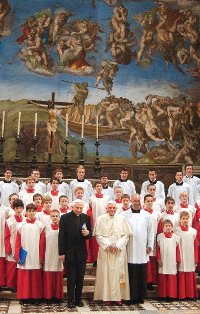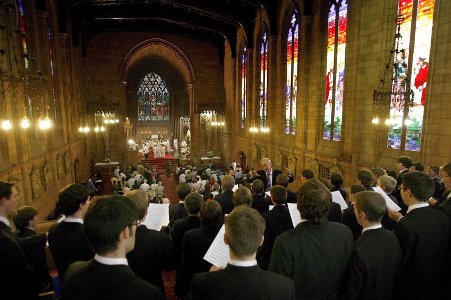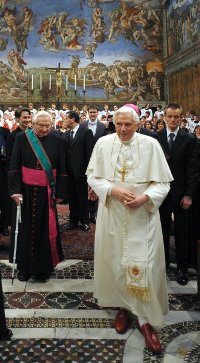By Matthias Bartsch, Frank Hornig, Conny Neumann, Markus Verbeet and Peter Wensierski
Spiegel
March 15, 2010
http://www.spiegel.de/international/germany/0,1518,683582,00.html
GERMANY -- Allegations of sexual abuse in the German Catholic Church continue to surface. Questions have been raised about what Pope Benedict XVI may have known about specific incidents of abuse and his brother, Georg Ratzinger, is also under fire. The pope, however, has so far remained silent.
Georg Ratzinger came clean about his transgressions. Indeed, it seemed to be the end of the matter -- one which placed him squarely in the center of Germany's ever expanding Church abuse scandal.
"In the beginning, I slapped (the boys) in the face on a number of occasions," said Ratzinger, who, for decades, was the director of the Regensburger Domspatzen, one of the most renowned boys' choirs in Germany. But he stopped the practice back in 1980, he says, because the state had banned corporal punishment. He says that he "strictly" observed the new law.
Former choirboys tell a different story. They still shudder when they recall the reverend's severity -- and his tendency toward violence, even in later years.
 |
| Pope Benedict XVI attending a concert by the Regensburg Domspatzen with his brother Georg Ratzinger at the Vatican. Ratzinger claims never to have known about sexual abuse that took place at the choir school just prior to the time when he took over the school's leadership. |
"Ratzinger was extremely choleric and quick-tempered during choir practice," says Thomas Mayer, who was a student at the choir boarding school from 1988 to 1992. "On a number of occasions, I saw him get so angry that he threw a chair into our group of singers." Once Ratzinger flew into such a rage during choir practice "that even his false teeth fell out," says Mayer.
Ratzinger, 86, now lives in a monastery and has declined to comment further. Clarification of the matter has now been left to his younger brother: Pope Benedict XVI.
 |
| Ratzinger stands accused of having physically abused choirboys, with one former singer recalling that Ratzinger would throw chairs at the choir in fits of rage. Once, during a fit of pique, his false teeth even fell out, according to one former pupil. |
Last Friday, Benedict XVI met in the Vatican with the Chairman of the German Bishops' Conference, Robert Zollitsch, to talk about violence and sexual abuse carried out by Catholic priests in his native Germany. Just like his older brother, the pope would like the world to believe that the Church has changed its ways. Benedict XVI and Zollitsch vowed to shed light on cases of abuse and assist the victims.
How Sincere?
But shortly after Zollitsch left for Germany, the pope found himself haunted by his own past as the Archbishop of Munich and Freising. His former archdiocese admitted to the center-left German daily Süddeutsche Zeitung that a pedophile priest had been reinstated to a Catholic parish in Munich during Ratzinger's tenure.
 |
| The Domspatzen episode is only one of many which have shaken the Catholic Church in Germany. Some 200 former pupils of Catholic schools have come forward in recent weeks claiming to have been sexually abused by priests. |
What does the pope know from personal experience about the abuse problem? And how sincere is his promise to finally clear up the allegations of abuse?
Hardly anyone in the inner circle of the Vatican is better informed on Catholic sex scandals than His Holiness the Pope. Joseph Ratzinger was head of the Congregation for the Doctrine of the Faith, formally known as the Inquisition. Reported cases of abuse automatically landed on his desk. Since 2001, as the Church's most powerful cardinal, and subsequently as the pope, Ratzinger has spearheaded the Vatican's ongoing efforts to shed light on this troublesome issue.
Nevertheless, sexual abuse in the Catholic Church has continued to regularly generate headlines. First, there were the waves of scandals in the US and Ireland. Now, hardly a day goes by in Germany without a new story on further allegations of abuse.
 |
| Pope Benedict XVI claims not to have known about an abusive priest who was sent to his diocese from Essen when the pope was still the Archbishop of Munich. Soon after his arrival, the abusive priest was once again involved in pastoral duties -- and once again allegedly involved in sexual abuse. The pope claims to have known nothing of the case. |
By the end of last week, some 200 presumed victims had contacted Ursula Raue, a Berlin attorney engaged by the Jesuits to handle abuse cases -- and complaints are pouring in from all areas of the Church. Some 150 people have come forward with stories of abuse at the monastery school in Ettal, and roughly 15 former choirboys have grievances relating to the Regensburger Domspatzen.
Complex Nature of the Problem
On top of this, there have been reports from other areas of society. Cases have surfaced virtually everywhere: in the Protestant Church, in secular boarding schools like Odenwaldschule and in children's homes in the former East Germany. The numbers are still a far cry from those linked to the Catholic Church, but they do reveal the complex nature of the problem.
It is a scandal the likes of which German society has not seen for years, and it will likely be months before it fades. Nonetheless, it is being inadequately addressed -- often to a shocking degree.
 |
| The church has promised to investigate the allegations of abuse. But many have criticized Pope Benedict XVI for having remained silent on the scandal thus far. |
This is true of the Catholic Church, which continues to damage itself as it hesitates between calls to clear up cases of abuse and the urge to hush things up. But it is also true of the state, as members of the government either let things take their course or drone on about the latest toothless initiative.
Should there be roundtable talks reserved only for members of the Catholic Church, or should they be open to a wide range of social groups? This question alone kept German ministers Kristina Schröder (family affairs), Annette Schavan (education and research) and Sabine Leutheusser-Schnarrenberger (justice) squabbling for days -- while Chancellor Angela Merkel stayed clear of the fray. A "broad and intensive debate" is required as a preliminary step, said Merkel's spokesman.
At the same time, the German school system has been severely shaken. Former students at the secular Odenwaldschule in Hesse describe systematic abuse that continued until at least the 1990s. Eight former teachers, one of whom taught there until 2003, are the subject of serious allegations made by nearly three dozen former students.
Laid Him on the Bed
One former student says that he was only allowed to call his parents twice a week -- and to do this, he had to use the phone in Gerold Becker's bedroom. Becker was the school principal from 1971 to 1985. When the student was sad about the end of his telephone call, he says that Becker laid him on the bed, undressed him, touched the boy's crotch, and then masturbated.
Another former student told of his fear of being the last one in the shower room with Becker after gym class. Yet another said that he was forced to engage in oral sex. "There was no way of avoiding them," says Gerhard Roese, 48, who now lives in the German city of Darmstadt. He says that he was repeatedly forced to stimulate his music teacher's genitalia with his hand. Distraught over the incidents, the boy confided in the school principal, but he only "smirked, hemmed and hawed, and said something about the Greeks," says Roese.
Becker refuses to comment on the allegations. But questions have also been aimed at Hartmut von Hentig, 84, the doyen of Germany's progressive education movement -- and Becker's long-time companion. Von Hentig has been pursued by journalists for days, he says. SPIEGEL was only able to submit questions to him in written form -- and he faxed back his answers.
In his response, von Hentig warned against false allegations and underscored that so far, "statements have only been collected, they have not yet been verified." He himself visited the boarding school on a number of occasions. Did he not find cause for suspicion?
"No," he replied. When he stayed overnight at Odenwaldschule, he "usually" slept in the official guest room. "The only time I actually saw Gerold Becker interact with the boys and girls at the school was when we all took our meals together in the dining hall or when we walked across the school grounds, and they jumped up to him and he fended them off in a friendly manner: 'You can see that I have a guest.'"
Part 2: Did the Pope Really Not Know?
Von Hentig doesn't blame himself for not having noticed anything. "I of course observed constantly and very carefully: filled with envy of this man who managed to relate so well to children, to explain things to them, to divert their attention or patiently coax them in order to keep them from getting into some kind of mischief. Filled with envy of 'his' wonderful school."
Why do those in positions of authority, including supervisors and witnesses, tend to have such difficulty getting to the bottom of these allegations, as is the case with von Hentig? Why are the state and the Church so helpless when it comes to the abuse of minors?
The Irish have demonstrated that it is possible to break through the wall of silence. For years, Yvonne Murphy, a judge acting at the behest of the government, headed an independent commission investigating how the Irish Roman Catholic Church handled complaints of clerical child sexual abuse.
Her report, released last November, concluded that "the vast majority (of priests) simply chose to turn a blind eye" to abuse.
'No Concern for the Abused Child'
The commission also found that the Church failed to act internally and ignored its own rules relating to priests suspected of abusing children. "For many years offenders were neither persecuted nor made accountable within the Church," the report says, citing an "obsessive concern with secrecy" and concluding that "there was little or no concern for the welfare of the abused child."
In Germany, federal and state governments would still rather leave it up to the bishops to clear up the allegations, despite the fact that these patriarchs of the Church have not indicated that they are genuinely capable of tackling the issue. Many Catholic leaders see incidents of abuse as unfortunate isolated episodes -- and not as a systemic problem.
Such an attitude disregards the fact that this has been a problem for the clergy right from the start -- and throughout 2,000 years of church history. "But if anyone causes one of these little ones who believe in me to sin, it would be better for him to have a large millstone hung around his neck and to be drowned in the depths of the sea," it is written in the Gospel of Matthew. In his Epistles to the Corinthians, even Paul inveighed against "boy prostitutes" and "pederasts."
Throughout the centuries, popes have threatened priests with punishment should they sexually abuse children. Such members of the clergy "shall be released from the priesthood or locked away to do penance in monasteries," wrote Pope Alexander III (1159 to 1181). They should be "punished according to Church or state laws," threatened Pope Leo X (1513 to 1521).
Despite these condemnations, Germany's bishops today still tend to turn a blind eye to "pederasts" in the clergy.
A Number of Hurdles
To the German Catholic Church's credit, however, Archbishop Zollitsch recently appointed the Bishop of Trier, Stephan Ackermann, to look into abuse cases. Ackermann promptly received a flood of phone calls, letters and e-mails from alleged victims. Still, he faces hurdles before he can begin his work. The German Bishops' Conference first has to decide where his office will be -- in Trier or Bonn? How many staff members is he allowed to have? What kind of equipment? How large will his budget be?
Fundamentalist bishops like Gerhard Ludwig Müller from Regensburg would rather adopt a more confrontational approach. Müller accuses SPIEGEL of "abusing the freedom of the press" in its reports on the Church, and he says that the magazine "is guilty of violating the human dignity of all Catholic priests and members of the order." He compares today's "anti-Catholic media campaigns against celibacy and Catholic sexual morals" to the "infamous speech by the master of sedition held in Berlin's Deutschlandhalle in 1937" -- a reference to Nazi Propaganda Minister Joseph Goebbels' attack on the Church. For Müller, in other words, critical reporting on the issue is far worse than the beating, rape and humiliation of children.
Meanwhile, new reports of horrendous abuse continue to pour in from his diocese -- primarily from the Regensburger Domspatzen.
From 1953 to 1992, Monsignor Hans Meier ruled with an iron fist over generations of choirboys who were under his tutelage in the Etterzhausen boarding school, a preparatory school for younger pupils from which the choir draws its recruits.
Religious services were held three times a day. Afterwards, in rows of two, the young boys would march from the church to the dining hall. When mail was distributed, the boys were forced to stand lined up in rank and file, and they often received severe beatings.
'Nothing that Merited My Attention'
Christian Wilbrand began attending the school at the age of nine in 1966. He recalls:
The idea was to shatter the personalities of us children. Brutality and our own fear were pervasive. Tortures included beatings with willow branches on the fingertips or the backside, punches to the head, pulling pupils up by their hair and hitting them with books. It didn't take long to beat the childhood right out of us; I often felt like I was on the verge of dying. Once my homeroom teacher hurled me with such force against the blackboard that I lost consciousness. Etterzhausen was a planet of horrors.
Is it conceivable that Georg Ratzinger knew nothing about this? As director of the cathedral choir, he took in the children from the fifth grade up, who then lived in his boarding school in Regensburg. He says: "When we were on concert tours, pupils would tell me about what life had been like for them at Etterzhausen. But their stories didn't strike me as anything that merited my official attention."
In 1971, when Ratzinger had already been the choir director for seven years, a local priest was sentenced to 11 months in prison for sexual abuse. The man in question was both the institution's music prefect and the head of the boarding school. Georg Ratzinger had an apartment in the building that housed the Domspatzen, and his brother Joseph often visited him there. Did they never hear anything about this case?
Former choirboy Mayer, who accompanied a large number of concert tours, says that he also witnessed widespread sexual and physical violence until he left the boarding school in 1992. He says that he himself was raped by older fellow students. Mayer also claims that anal sex took place between students on a number of occasions in a prefect's apartment, right next to the rooms used by the senior classes. "They simply passed on the pressure of a totalitarian system," he says.
Allegedly Knew Nothing
The Regensburg Diocese has refused to comment on any of the allegations -- and Georg Ratzinger is now remaining silent as well.
And what of Benedict XVI? Publicly he has not uttered a single word about the allegations against his brother.
Indeed, he has still refrained from commenting on the cases dating back to his tenure as Archbishop of Munich. The priest Peter H. first came to the attention of the diocese in Essen after he forced an 11-year-old boy to engage in oral sex. He was sent to Munich for therapy. In 1980, as a member of the Diocese Council, Joseph Ratzinger was involved in a decision to grant Peter H. accommodations in a parsonage.
Shortly thereafter, the man was again involved in pastoral duties, with no restrictions whatsoever. In 1986, a court in Ebersberg gave H. an 18-month suspended prison sentence because he had once again sexually abused a minor, this time in the Bavarian town of Grafing.
H. was nevertheless reinstated and he held holiday services with children from the Heart of Jesus Daycare Center in Garching, and had numerous contacts with minors.
Just last Friday, he was scheduled to attend the ITB Berlin tourism trade show and take part in a panel discussion on "pilgrims' paths, village churches and monastery vacations." H. canceled at the last minute.
"Reassigning H. to pastoral ministry was a serious mistake. I take full responsibility," says former Munich Vicar-General Gerhard Gruber.
The pope allegedly knew nothing about the entire case.
Any original material on these pages is copyright © BishopAccountability.org 2004. Reproduce freely with attribution.